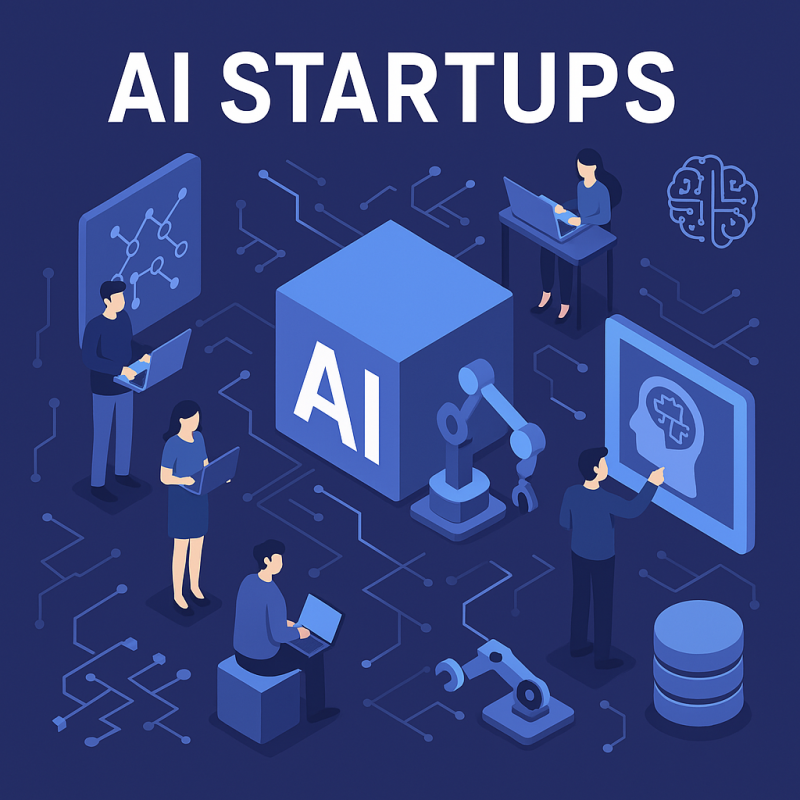Table of Contents Show
Artificial Intelligence (AI) is no longer the future – it’s here, and it’s rewriting the rules of the game across every industry you can think of. From healthcare and finance to retail, transportation, and cybersecurity, AI is transforming the way businesses operate. And at the heart of this revolution are startups. Agile, visionary, and tech-savvy, these companies are pushing the boundaries of what AI can do.
In this article, we’re spotlighting 10 AI startups and scaleups that are leading the charge in disruption. Some are already household names, others are rising fast – but all of them are shaping the future of technology in bold, imaginative ways.
1. OpenAI
Let’s start with the juggernaut: OpenAI.
Founded in 2015, OpenAI began as a nonprofit research lab with a clear mission – to ensure that artificial general intelligence (AGI) benefits all of humanity. That’s a big goal, and the organization is living up to it. Their most famous innovation, GPT (Generative Pre-trained Transformer), has made waves worldwide, culminating in GPT-4, which powers ChatGPT and other tools.
OpenAI’s technology is behind a massive wave of innovation in natural language processing (NLP). From writing code and generating art to conducting advanced research and customer support, their tools have redefined productivity and creativity.
What’s especially interesting about OpenAI is their open collaboration model – early on, they published research and made code freely available. As the company evolved and commercialized, especially through its partnership with Microsoft, it maintained a research-led ethos while rolling out powerful enterprise solutions.
2. DeepMind
Another titan in the AI world is DeepMind, a UK-based startup acquired by Google’s parent company Alphabet in 2015. DeepMind first made headlines with AlphaGo – the AI system that beat a world champion Go player in 2016. But their ambitions go much further.
DeepMind applies AI to some of the most complex challenges in science and medicine. Their work on protein folding, through the AlphaFold system, solved a 50-year-old biology problem by predicting 3D protein structures with remarkable accuracy – earning praise from the global scientific community and opening up potential breakthroughs in drug discovery and disease treatment.
They’ve also developed AI systems that optimize energy usage in Google data centers, showing just how impactful AI can be when applied at scale to real-world problems.
3. UiPath
When we talk about productivity and automation, UiPath is a name that comes up often. This company is a leader in Robotic Process Automation (RPA), using AI to automate boring, repetitive tasks that normally clog up employee time.
UiPath’s platform allows businesses to deploy “software robots” that handle things like data entry, form processing, and compliance checks. The goal? To free up human workers to focus on more valuable, strategic tasks.
What sets UiPath apart is its commitment to making automation accessible to non-tech users. Their platform has a drag-and-drop interface and integrates with common enterprise software, making it easy for businesses of all sizes to dip their toes into AI.
4. DataRobot
AI is powerful, but building AI models is often labor-intensive and requires deep technical expertise. DataRobot set out to change that.
This company offers a platform for automated machine learning (AutoML), enabling users to build, test, and deploy predictive models without needing to write code. Businesses can feed in their data and get insights quickly – ideal for industries that rely heavily on forecasting, like finance, insurance, and marketing.
DataRobot’s ability to democratize data science has attracted clients from all over the globe. They support everything from customer churn analysis to fraud detection, showing how AI can drive smarter decisions in virtually any field.
5. SenseTime
Based in China, SenseTime is one of the world’s largest AI unicorns specializing in computer vision – essentially, teaching machines to “see” and understand images.
SenseTime’s technology powers facial recognition, surveillance systems, augmented reality, autonomous vehicles, and even smartphone filters. Their AI engines can process vast amounts of visual data in real time, making them a key player in smart city development, retail, and transportation.
Although they’ve faced scrutiny over privacy and ethical concerns, there’s no denying that SenseTime’s innovation in image processing is ahead of the curve. Their work is pushing boundaries in both commercial and scientific applications.
6. Zebra Medical Vision
Healthcare is a huge frontier for AI, and Zebra Medical Vision is tackling it head-on. This Israeli startup develops AI algorithms that read medical imaging data – X-rays, CT scans, MRIs – and flag potential issues such as tumors, fractures, and heart conditions.
Their platform supports radiologists by acting as a second set of (digital) eyes, improving diagnostic accuracy and enabling early intervention. With healthcare systems under pressure globally, solutions like Zebra’s can dramatically reduce workloads and improve patient outcomes.
Their AI models are trained on millions of images and can detect dozens of conditions, helping underserved communities access better healthcare faster and more affordably.
7. Cognitivescale
Cognitivescale is all about smarter enterprise AI. Their Cortex platform helps organizations in sectors like finance, insurance, and healthcare develop “AI-powered decisioning systems” – essentially tools that make real-time business decisions smarter and more contextual.
They focus heavily on explainable AI (XAI), meaning their systems are built to be transparent and auditable – vital in industries where trust and compliance matter. Their “Trusted AI” approach helps companies deploy AI responsibly and ethically, addressing the growing concern over biased algorithms.
Whether it’s improving loan approval processes or optimizing insurance claim workflows, Cognitivescale is helping organizations deploy AI with both intelligence and integrity.
8. Nuro
Imagine a future where groceries, takeout, or prescriptions are delivered by small, self-driving vehicles. That’s what Nuro is building.
Founded by two ex-Google engineers, Nuro specializes in autonomous delivery robots designed specifically for short-range transport. Their electric vehicles are smaller than traditional cars, don’t carry passengers, and are optimized for efficiency and safety.
Nuro has already partnered with major brands like Kroger and Domino’s in pilot programs across the U.S. These trials have shown that contactless, AI-powered delivery is not only feasible – it’s desirable, especially in a post-pandemic world.
9. Tempus
Tempus is another startup transforming healthcare – but they’re approaching it through data.
Founded by Groupon co-founder Eric Lefkofsky, Tempus uses AI to analyze clinical and molecular data to personalize cancer treatment and other therapies. Their platform ingests structured and unstructured medical data – think lab results, physician notes, genetic information – and delivers actionable insights.
By making sense of the massive and messy datasets that define modern medicine, Tempus helps doctors make faster, more informed decisions. Their work supports the growing field of precision medicine, where treatments are tailored to individual patients rather than one-size-fits-all.
10. Darktrace
Cybersecurity is an arms race – and Darktrace is one of the few companies giving defenders a fighting chance.
Using AI inspired by the human immune system, Darktrace’s platform identifies abnormal behavior in networks and stops cyberattacks in real-time. It’s like having a digital security guard who learns continuously and never sleeps.
The company’s “Enterprise Immune System” monitors everything from emails to cloud environments, and it reacts autonomously when something seems off. With cyberattacks growing in sophistication and frequency, Darktrace’s proactive, AI-driven approach has attracted customers in over 100 countries.
They’re especially known for stopping zero-day threats – attacks that exploit previously unknown vulnerabilities – which makes their tech indispensable in today’s threat landscape.
Final Thoughts
These 10 startups aren’t just building tools – they’re redefining entire industries. The rise of AI startups shows that innovation doesn’t always come from tech giants; sometimes, it’s the nimble, bold, and focused companies that make the biggest impact.
Whether it’s reading medical scans, automating back-office work, delivering your dinner, or stopping a cyberattack before it starts, these companies are setting the pace for what’s next.
And this is just the beginning.
As AI continues to evolve, we’ll see even more startups emerge – many in fields we can’t yet imagine. According to TechCrunch, global AI startup funding hit $68 billion in 2021, with growth continuing in 2023 and 2024 despite broader tech downturns. The appetite for AI disruption is clearly not slowing down.
If you’re watching the future unfold – and especially if you’re in business, tech, healthcare, or logistics – these are the companies to keep an eye on. Their innovations today could be your tools tomorrow.








